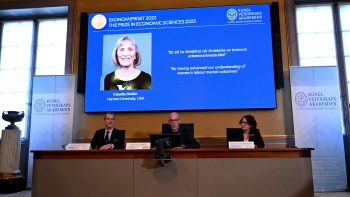George Soros: What if the world isn’t worth saving?
Kai Ryssdal: There is — if you really stop to think about it — one basic question behind all investing decisions: Is the return worth the risk?
So with that in mind, what about Wall Street itself? Does the financial system pass the test? That’s the basic idea behind our series Economy 4.0: how to make the global economy, including the financial system, work better for more people. Our special correspondent David Brancaccio has been in Bretton Woods, N.H., the past couple of days for a series of meetings and conversations about exactly that topic.
David Brancaccio: The setting of our conversation was a round table in the grand hotel where debate in 1944 led to the Bretton Woods Agreement, which defined the financial system coming out of World War II. Eighty-year-old George Soros, investor and philanthropist, was part of a new conference he helped sponsor in recent days on what was advertised as “new economic thinking.”
I asked Soros about regulation in the wake of the financial collapse but his answer took an unexpected turn.
George Soros: We haven’t really decided whether this swollen financial system is a benefit or a detriment, a disease or is that a great source of strength.
Brancaccio: You of all people are wondering if the financial sector creates benefits to society commensurate with its size in the economy?
Soros: Obviously, we need financial services and obviously they are beneficial. But to have 7 or 8 percent of the GDP — that may be too much!
Soros says it’s in part about the huge number of derivatives that can cut both ways. (EXTRA: Listen to the full-length interview)
Soros: The financial markets produce the instabilities, the fluctuations, the volatility against which they also then provide the insurance.
Soros wasn’t the only one to pose this almost existential question. Adair Lord Turner is a top financial regulator in Britain. He told the conference the more he thinks about measuring what the financial sector brings to the economy:
Adair Lord Turner: The less certain I am about what, if anything, measures are actually telling us.
Solving this matters for a lot of reasons. If Wall Street’s real contributions are less than thought, then the cost of reigning in its excesses through new policies would not be as high. A smaller financial sector might also attract fewer of the best and brightest people, who might then use their talents to do other important work the economy needs.
But also at the conference was Harvard historian Niall Ferguson, who cautions not to get simplistic about the social value of Wall Street.
Niall Ferguson: Most of the financial innovation that began in the 1980s was beneficial, increased economic efficiency and increased the efficiency of the world economy as a whole.
This’ll only be resolved if economists take up this challenge and come up with new thinking to measure costs versus benefits of financial services.
In Bretton Woods, N.H., I’m David Brancaccio for Marketplace.
Ryssdal: You can hear more about a new Bretton Woods agreement and other Economy 4.0 stories here.
There’s a lot happening in the world. Through it all, Marketplace is here for you.
You rely on Marketplace to break down the world’s events and tell you how it affects you in a fact-based, approachable way. We rely on your financial support to keep making that possible.
Your donation today powers the independent journalism that you rely on. For just $5/month, you can help sustain Marketplace so we can keep reporting on the things that matter to you.


















